I’ll admit — I’m not the most digitally-savvy person around.
I was initially reluctant to hop onto the trend of digital payments the first time a group of friends and I used PayLah! to split the bill at a restaurant, around five years ago.
This was despite everyone being so excited about the convenience the app would bring.
“Huh, just go and download lah!” a friend cajoled me.
I figured that I would be “left behind” if I didn’t move with the times, and so I eventually downloaded the app.
Disclaimer: I’m not even that old yet.
A learning opportunity for the less digitally-savvy
Perhaps it was this sense of “keeping up with the times” that led me to Bukit Canberra Community Hub one Sunday morning for Canberra Day 2023.
With the aim of promoting community programmes and volunteerism, this event was estimated to have drawn some 5,000 residents from all ages and backgrounds.
At the hub, I shadowed DBS staff volunteers who were running workshops for seniors on how to make cashless payments and spot potential scams.
These workshops are part of DBS Foundation’s partnership with the Infocomm Media Development Authority (IMDA), in support of the national Digital for Life movement.
They aim to foster a more digitally inclusive society in which no one is left behind.
I was curious to see how the volunteers engage the seniors, and pick up some tips on how to guide elderly relatives who ask me for advice with technology as well.
Before stationing myself at the booth, I donned a DBS shirt to blend in, while two DBS staff, Miki Kong, 23, and Clyde Lim, 28, showed me the ropes.
Apps can feel foreign to some
Lim, who volunteers with the People's Association in his free time, handled all the enquiries that came his way like a pro.
He warmly greeted a middle-aged lady before helping her set up DBS Internet Banking, PayLah! and PayNow. He then demonstrated how she can make cashless payments, as part of an e-payment learning journey.
At each step, he paused while the woman diligently scribbled down information in a small notebook.
While he mainly helps seniors learn how to make digital payments, Kong told me about some other issues that seniors often come to the booth for:
"I forgot my username/PIN."
"What is this transaction in my bank statement? I don't remember making it."
This made me realise that I had taken my ability to navigate the digital world and do tasks such as resetting my PIN or checking the origin of a transaction for granted.
While these “simple” tasks may be easy for those of us who grew up in the digital age, they can be an uphill and unfamiliar challenge for some seniors.
Bringing across the importance of digital security
Kong added that some seniors had shared frustrations about processes being “complicated”.
"Why must it be so difficult?" she recalled a senior lamenting to her.
"Must remember username, PIN, get OTP..."
She and the other volunteers would explain why these layers of security are important, and educate them on the risks of exposing their personal information.
As if on cue, Lim explained to an uncle he was attending to, "[You] can’t use too many '1's [in your password]! That's why [it was] rejected."
He went on to explain that passwords with consecutive numbers like ‘1111’ are unsafe as they are easily hacked.
Curiously, I asked Lim if it was fine for seniors to save their passwords on their phones, in case they were forgetful.
“No, actually that’s quite risky,” Lim corrected me, “We would advise the seniors not to do that.”
He recounted an instance where a senior’s phone, which contained his iBanking password, went missing.
That particular senior was beyond worry for months on end, and kept checking if any transactions were made on his bank account.
Whoops. That was the moment when I felt like I really needed to brush up on my digital security knowledge.
Given the rise in scams in the past few years, it was reassuring to see that this message of not neglecting security for the sake of convenience was being emphasised to the seniors.
Patient and dedicated volunteers
After a tiring week at work, many might choose to sleep in or rest on a Sunday morning.
As I’m no exception, this made me admire the patience and dedication of the staff volunteers who made the effort to come all the way down to Canberra on a day where they could be resting instead.
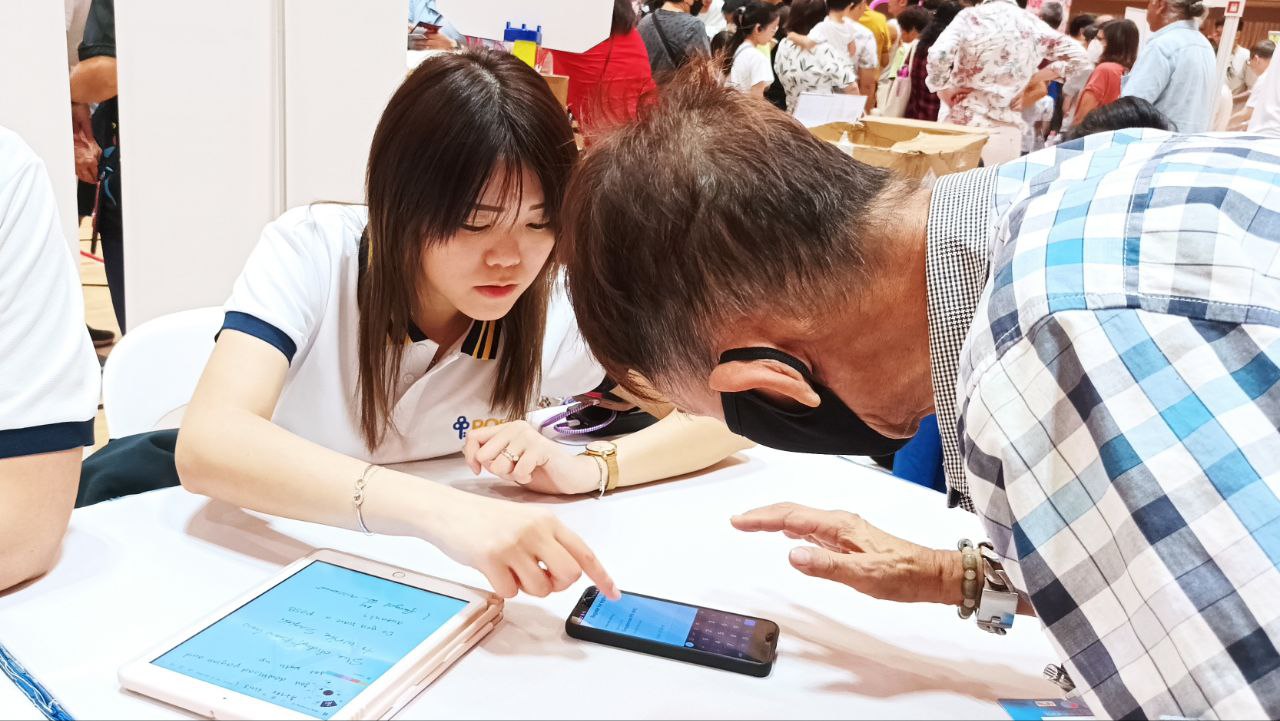 Photo by Berlinda Ang.
Photo by Berlinda Ang.
Kong, who professed that she is not a morning person, was engrossed in helping an uncle who is hard of hearing and had difficulties expressing himself.
Amidst the crowd and buzz of wushu performances in the background, she resourcefully communicated with him by scribbling on an iPad.
She carefully and patiently explained each action she performed on the app, while the uncle jotted down his queries and nodded appreciatively.
Some of the seniors, just like this uncle, stayed at the booth for as long as 45 minutes, showing a real hunger to learn.
Hands-on opportunity to apply skills learnt
Despite their enthusiasm, Kong and Lim pointed out that some seniors struggle to retain what they have learnt, especially if they do not have the opportunity to practise these digital skills.
To incentivise them to make their first cashless payment, seniors above the age of 60 who attended the workshop and were new to PayLah! received S$5 credit in their e-wallet.
The amount could be used to scan-and-pay for sundries at a makeshift minimart onsite, under the guidance of volunteers from DBS and SG Digital Office (SDO).
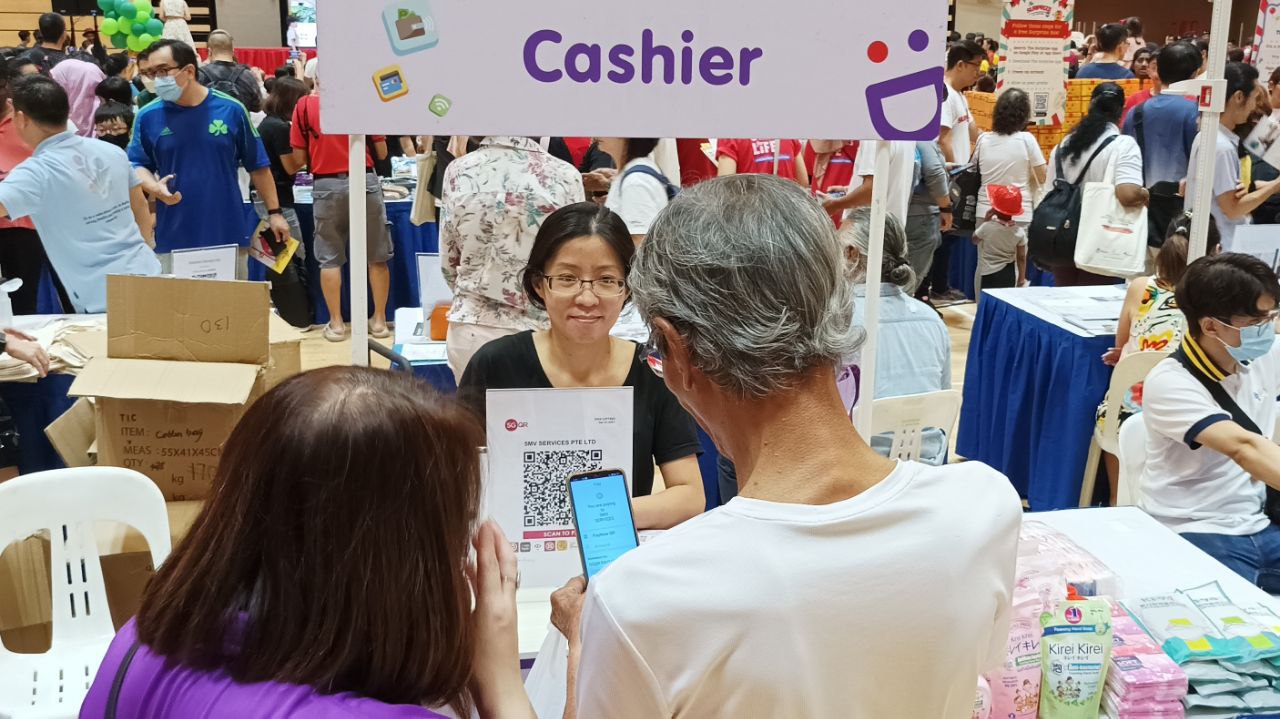 Shah making a scan-and-pay purchase at the makeshift minimart. Photo by Berlinda Ang.
Shah making a scan-and-pay purchase at the makeshift minimart. Photo by Berlinda Ang.
I spoke to Mohd Shah, 72, who visited the booth.
He told me about how he had been wanting to pick up digital literacy skills, but never had the chance prior to the event.
Shah said that he previously signed up for digital courses organised by other agencies which lasted “eight to nine hours”, but ended up not being able to attend as he is the primary caretaker to his wife who fell ill.
These days, he opts to attend shorter roadshows or workshops which take an hour or two.
Shah laughed, "My wife was the one who registered for me [for today’s event]. She is the savvier one who knows how to do digital bank transfers, Paylah! [and so on]. I’ve always wanted to learn."
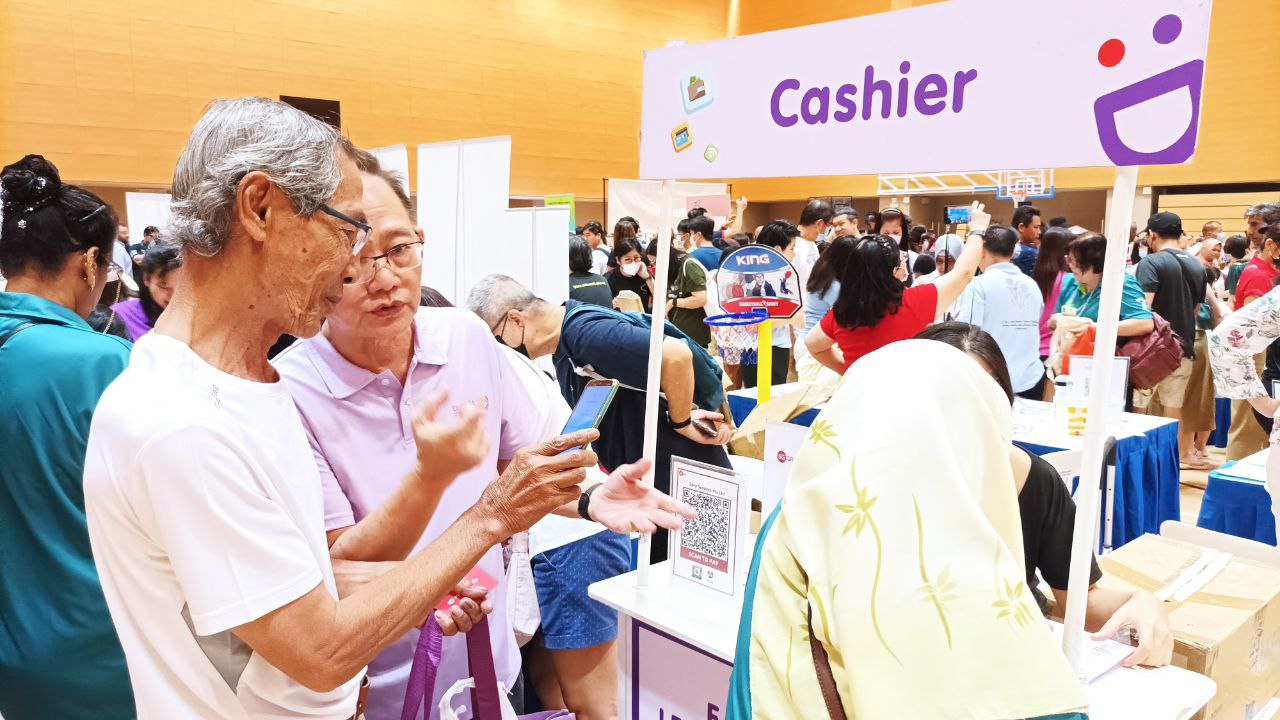 Shah interacting with a volunteer at Canberra Day 2023. Photo via Berlinda Ang.
Shah interacting with a volunteer at Canberra Day 2023. Photo via Berlinda Ang.
He liked that the sessions were hands-on, and that the volunteers guided him through the steps in detail.
"I find them very accommodating," he added, "The whole team is helpful."
Shah’s eagerness in learning a new skill and seizing every opportunity to do so at his age really inspired me. Mad respect to seniors like him.
Creating awareness of scams
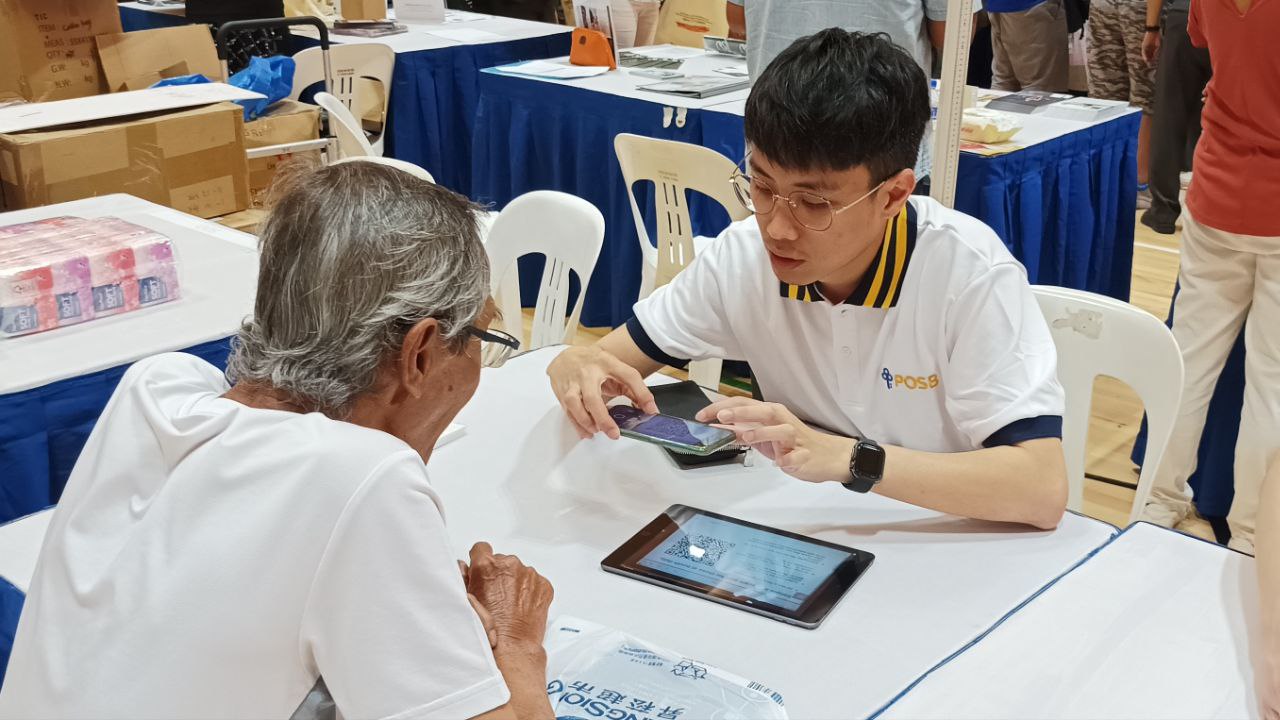 Shah getting assistance from a volunteer to try a quiz about scams and phishing. Photo via Berlinda Ang.
Shah getting assistance from a volunteer to try a quiz about scams and phishing. Photo via Berlinda Ang.
After this, I popped by another booth that had volunteers educating seniors on an equally important matter – how to spot potential scams.
Participants were required to scan a QR code to complete a short 5-question quiz about scams and phishing, which includes common misconceptions that many may have.
"If they get any questions wrong, we will explain the correct answer and address these misconceptions," a DBS volunteer explained, "The key is to create awareness of scams and to give seniors advice [so they can avoid getting scammed]."
Seniors practise going cashless
My last stop of the day was at the nearby hawker centre for another workshop, where DBS volunteers and SDO Digital Ambassadors trained seniors to make cashless payments in a more realistic setting.
Instead of a minimart, like in the earlier workshop – here, after a run-through of how it works, the volunteers would offer to guide the seniors in buying drinks or food using cashless payments at one of the hawker stalls.
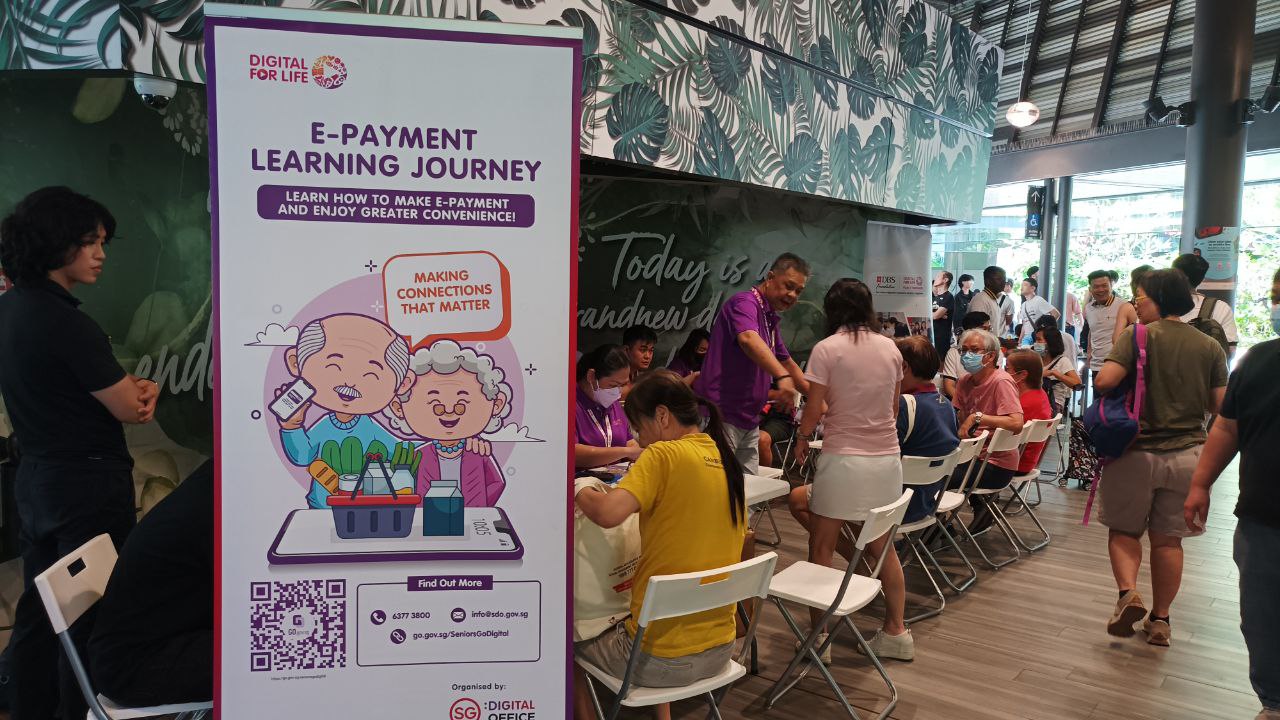 An E-Payment Learning Journey booth manned by volunteers from DBS and SDO at Bukit Canberra Hawker Centre. Photo by Berlinda Ang.
An E-Payment Learning Journey booth manned by volunteers from DBS and SDO at Bukit Canberra Hawker Centre. Photo by Berlinda Ang.
I accompanied a couple who was game enough to try it out.
Pan, 62, said that he is familiar with cashless payments, and uses them at hawker stalls that offer that option.
His missus, who is a housewife, was less confident as it was her first time trying it out.
Pan’s wife admitted that she couldn’t really remember the steps, so one of the SDO Digital Ambassadors demonstrated how to scan the QR code and enter the correct amount for the transaction at the drink stall.
While she was in the queue, I could see her hands trembling slightly as she held onto her phone, with the QR scanner pre-loaded.
Though Mrs Pan’s hands fumbled slightly when keying in the transaction, the stall owner waited patiently for her and the volunteer guided her step-by-step through the process.
“You can double-check with the screen [on the vendor’s machine],” the volunteer reminded her at the final step, “Make sure you enter the correct amount before pressing “Pay”.”
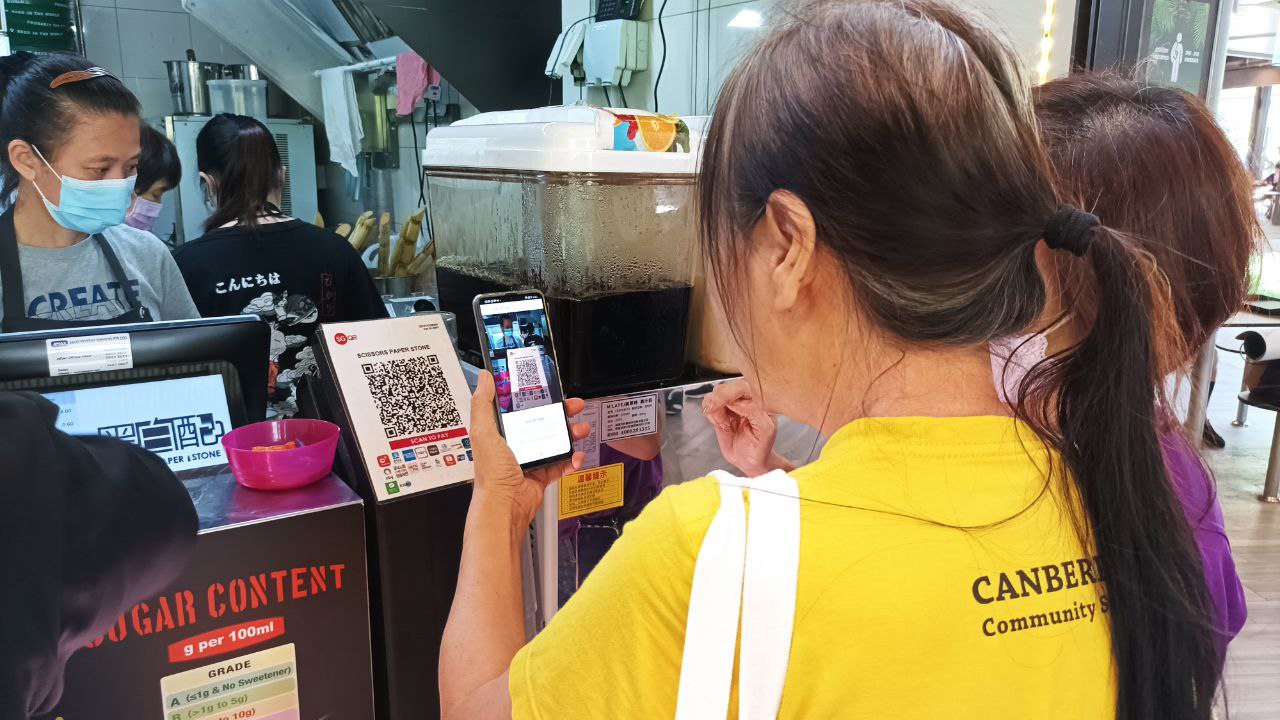 Mrs Pan scanning the QR code at the drink stall to make a cashless payment. Photo via Berlinda Ang.
Mrs Pan scanning the QR code at the drink stall to make a cashless payment. Photo via Berlinda Ang.
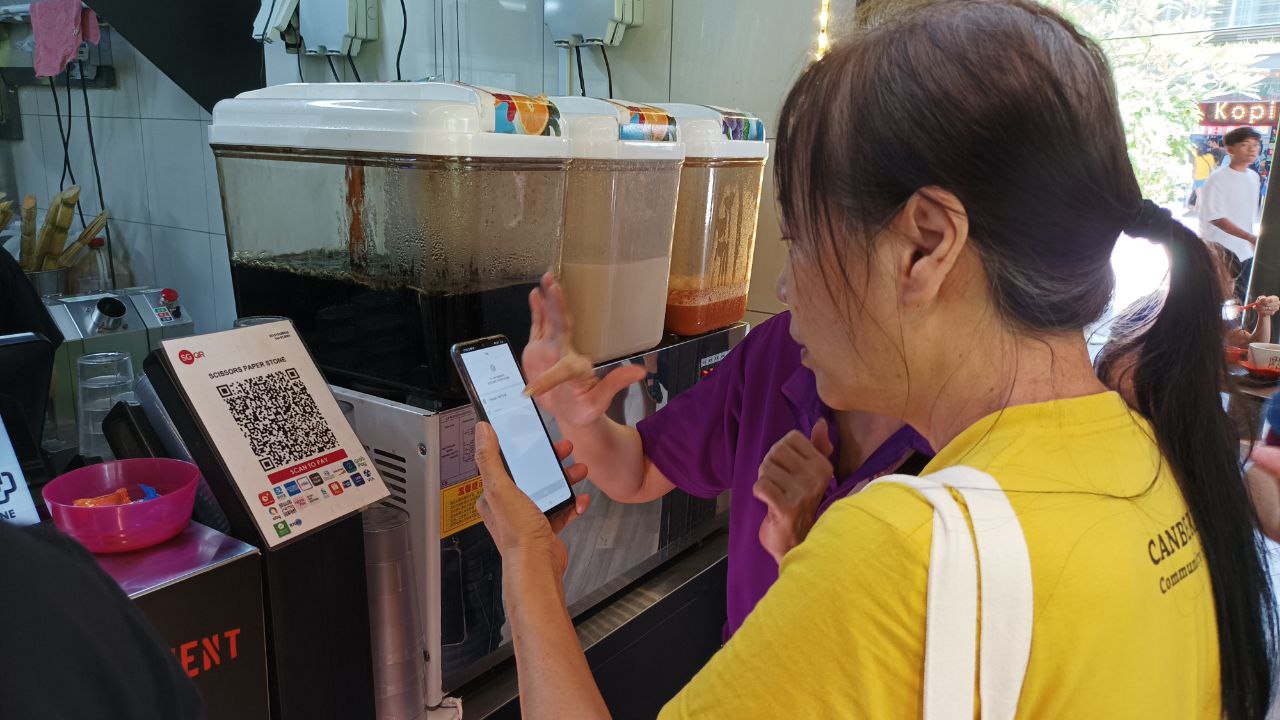 An SDO Digital Ambassador guiding Mrs Pan in making the cashless transaction. Photo via Berlinda Ang.
An SDO Digital Ambassador guiding Mrs Pan in making the cashless transaction. Photo via Berlinda Ang.
Once done, the couple collected a small reward: two cups of sugar cane drink.
"It was quite easy!" Pan’s wife said with a relieved smile.
I asked Pan if he was confident in guiding his wife on how to use digital payment apps.
"I think [it's] a bit hard," he admits with a chuckle, "I sometimes forget [as well]. But I can always just ask my daughter!"
This reminded me that beyond the work of digital literacy volunteers, we can play our part at home to help our aged parents and relatives with technology too.
After all, so many of the seniors I met were willing to learn, as long as someone was there to teach them.
Aims to reach out to 100,000 residents by 2024
Ensuring that no one is left behind sits at the heart of this collaboration between DBS Foundation and IMDA, which aims to reach out to some 100,000 Singaporeans and residents by the end of 2024.
They will be conducting about 800 workshops over two years to help the less digitally-savvy to embrace digital learning, including senior citizens, youths, hawkers, and special needs individuals.
These will be jointly run by volunteers from DBS and SDO.
As part of the partnership, DBS is also providing S$500,000 in grants to digital literacy and digital inclusion projects via the Digital for Life Fund.
“We’re living in a world that’s rapidly digitalising, and it’s imperative that we empower the less digitally-savvy to navigate these changes as well. It is our hope that by helping them to pick up key digital skills, we’re also helping them to face the future with more confidence,“ said Monica Datta, Head of the Community Impact Chapter at DBS Foundation.
She acknowledged that for many participants, a key challenge they faced in this process was the uncertainty of embarking on something unfamiliar.
“Simply providing access to digital tools and skills isn’t enough. What’s more important is to have people there to guide and hand-hold them, till they gain the confidence to move forward on their own. We’re thus very thankful to our volunteers from both DBS and SDO, who play a very vital role in these learning journeys,” she continued.
You can check out this schedule for the other planned workshops and locations.
This sponsored article by DBS helped the writer appreciate the efforts of digital literacy volunteers.
Photos by Berlinda Ang.
If you like what you read, follow us on Facebook, Instagram, Twitter and Telegram to get the latest updates.
